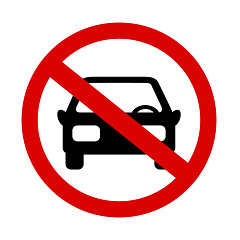In response to the question asked about calling the police for possible robbery when hearing the car alarm, about just 0.3 % of the respondents answered always call police and about 9% sometimes call the police while more than 90% of them have never ever taken any action. It can be explained by this fact; many people have learned that automobile theft alarms are often false. Therefore, when they hear one, they may disregard it because they have mentally conceptualized the automobile theft alarm stimulus as unreliable (Bliss et al., 2007; Hazalbaker, 1997).
The third question has been about the respondents’ reaction while hearing the car alarm; the collected answers were divided to 9 categories. The results are shown in table 1. The next question was about the real efficiency of car alarms in robbery prevention including none, low, medium, high and very high options, the results are summarized in Figure 2.
More than 75% of the responds, when asking if car alarm has ever interfered with the ability to sleep, was “Yes”. Beside that about 84% of the respondents have problem with its interference while studying at home or in the school (Figure 3). At an elementary school in Inwood, similar findings indicated that children in the noisier side of a school were 3 to 4 months behind in reading comprehension than children in quieter ones (Bronzaft and McCarthy, 1975).
[…]
As it arises from the questionnaires, about 66% of respondents are faced with car alarm sirens more than 3 times a day which is beyond their mental and physical bearing capacity, concerning the nature of the noise. It interferes with the ability of 76% to sleep and with the ability of 84% to study at school or home, particularly significant because they are students. The rated noise annoyance was on average 6.2 which is well above moderate.
It should also be mentioned that car alarms are especially harmful for two reasons. First, their variable noise can’t be “tuned out” as easily as steady sounds. Second, many new car alarms exceed 125 decibels (dBA). This is louder than the sound of a jet airplane taking off 200 feet away. Alarms erode the sense of neighborliness and mutual respect necessary for life in densely‐populated cities (Friedman et al., 2003).
On the other hand, just 3% of the respondents call police upon hearing the car alarm and 97% face it with fortitude, anger, no concentration and calmness, inconvenience, horror and stress (75%) and objection, seeking for the reason, worry about any possible incident (22%). It seems that the most important reason for taking no action is due to no belief in car alarms effectiveness as it is shown in figure(2) that just one‐third (36%) of the people believe that it has high and very high efficiency in car theft prevention.
Similar findings are reported in VTPI (2009); the authors stated that car alarms are not very effective at preventing thefts: most alarms are false and cars with alarms are just as likely to be broken into those without.
(Emphasis added.)
I’ve hated car alarms ever since I was little. I still remember that night when I was staying at a hotel and I obliviously pressed a car alarm button, forcing my uncle to run outside to turn it off, and waking up my grandfather, who got up to stare at me for a few dozen seconds before he returned to bed. I was embarrassed.
Several days ago there was an incident in my house where I was waiting in the garage for somebody and the car alarm suddenly exploded without warning. My driver had accidentally pushed the car alarm button when she was opening the door, and I was so exhausted—almost traumatized—from the incident that I hardly said anything that day and I stayed home the next.


The worst are alarms which use a horn as sound generator or as activation confirmation (Mercedes, BMW?).